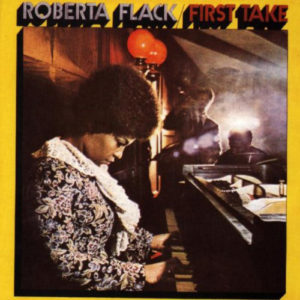Atlantic 8230
Producer: Joel Dorn
Track listing: Compared to What / Angelitos Negros / Our Ages or Our Hearts / I Told Jesus /
Hey, That’s No Way to Say Goodbye / The First Time Ever I Saw Your Face / Tryin’ Times /
Ballad of the Sad Young Men

April 29, 1972
5 weeks
Roberta Flack’s first album was released in June 1969, but didn’t crack the Top LP’s & Tape chart until January 31, 1970. It spent two weeks at number 195, before falling off the chart altogether, but that wouldn’t be the last time First Take would grace the pages of Billboard.
Following the initial disappointing showing of First Take, Flack, a North Carolina-bred former
school teacher, experienced some success with her second album, 1970’s Chapter Two, which
peaked at number 33. Her third effort, 1971’s Quiet Fire made number 18. Yet her career
didn’t really begin to take off until 1972, when her smoldering version of the folk song “The
First Time Ever I Saw Your Face,” an album cut on First Take, was included in Play Misty for
Me, the 1972 suspense thriller starring Clint Eastwood as a disc jockey.
“My mom answered the phone and said, ‘Clint Eastwood is on the phone.’ She didn’t know
who he was by name, but I did and I was shocked, chagrined, mortified,” Flack says. “He
said he wanted to use this song. That was three years later, and everybody had been telling me
that it was too slow, so I had started to pick up the tempo when I played it live. People
responded to it live, but it hadn’t been released as a single. It didn’t have any commercial
importance to me, but I was in love with it. When he said he wanted to use it, I said, ‘I would
like to do it again, because it’s too slow.’ But he said, ‘It’s perfect, I love it, it’s just the right
length. I want to use every note just the way it is.?
After the film became a hit, Atlantic released “The First Time Ever I Saw Your Face” as a
single, and it and First Take began to climb the charts. The album reentered the chart on
March 18, 1972, with the single already racing up the Hot 100. “The First Time Ever I Saw
Your Face” hit Number One on April 15. Two weeks later First Take also hit the peak, with
the single still holding the Number One position.
The album’s title was literal. First Take was recorded in a mere 10 hours over a two-day
period. For Flack, who had 600 songs in her repertoire when she auditioned for Atlantic,
narrowing the field for the album was difficult. “I did about 16 or 17 songs,” she says, “and
we took the best ones, which were usually the first takes.”
Among the other tracks included on First Take were a cover of Leonard Cohen’s “Hey, That’s
No Way to Say Goodbye” and “Angelitos Negros.” The latter tune was inspired by Flack’s
desire to make a pro-black statement, but also by her boyfriend at the time, who spoke fluent
Spanish. “I used to sing ‘The Impossible Dream’ and ‘We Shall Overcome’ in my live set and
dedicate it to Dr. King,” Flack says. “People would come up to me and say that they liked the
way I sung these songs of protest, because I sang them with such love.” In “Angelitos
Negros,” which means “Black Angels,” Flack introduces the song by asking, “Painters, why do
you always paint white virgins? Paint beautiful black angels.” Says Flack, “That song makes a
very beautiful statement,” Thanks to Clint Eastwood, that statement was finally heard.
THE TOP FIVE
Week of April 29, 1972
1. First Take, Roberta Flack
2. America, America
3. Harvest, Neil Young
4. Eat a Peach, Allman Brothers
5. Fragile, Yes
